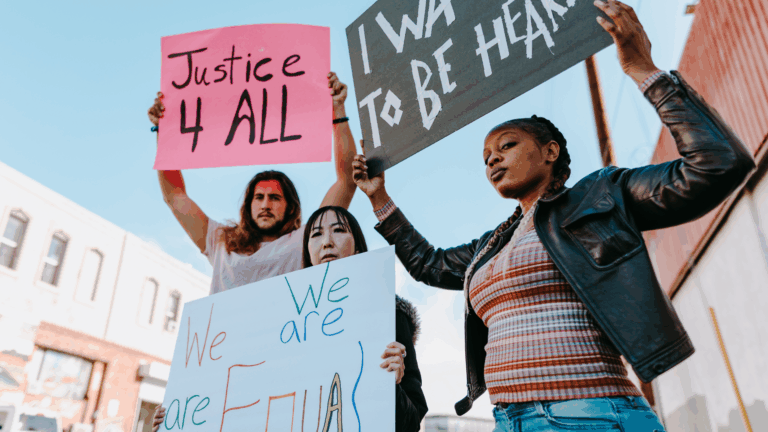This post is the third in a three-part series about gay people, the Holy Spirit, and the Church. (Part 1, Part 2). In Part 3, we explore how churches can be led by the Holy Spirit to become places where gay people thrive according to a historic sexual ethic. We’ll explore the following questions: How has God called the Church to love gay people? And how will the Holy Spirit help the Church become a place where gay people can belong and thrive according to orthodox Christian sexual ethics?
Gay people have seen some bad fruit coming from the Church, but it’s not because gay people aren’t trying hard enough. It’s because they’re forced to work things out on their own. Gay people need the Church to step up and commit to learning how to love gay people well.
How has God called the Church to love gay people? And how will the Holy Spirit help the Church become a place where gay people can belong and thrive according to historic Christian sexual ethics?
1. Invite all Christians to Think Theologically About Their Sexual Stewardship
Most churches today lead straight Christians to assume that they will get married, teach that we need romantic companionship to be happy, and ignore the Bible’s teachings about lifetime celibacy and divorce. This leads to high divorce rates and a void of theology and practice of lifetime abstinent singleness among straight Christians.
But the Church calls gay Christians to a higher standard of sexual stewardship by allowing straight Christians to misuse marriage for their romantic fulfillment while asking only gay Christians to consider vocational singleness. Instead, our churches have got to become places where everyone is thinking theologically about their sexual stewardship.
We need to teach that God first calls everyone to a period of abstinent singleness during which we discern whether we are called to a lifetime vocation of celibacy or a lifetime vocation of Christian marriage with someone of the opposite sex.
These churches teach that every Christian has the same inherent capacity for both vocations and every Christian, gay or straight, should offer the question of vocational singleness or Christian marriage to God.
2. Talk Publicly About the Questions in the Intersection of Faith and Sexuality
Most churches today avoid the topic of God’s love for gay people, so the average church-goer doesn’t know how to have compassionate and theologically accurate conversations with friends. As a result, gay people don’t know whether it is safe to share their story. Churches that sit the fence on this topic hurt gay Christians because their indecision limits their ability to invest in something better. Instead, our churches need to become places that talk publicly about the cultural questions in the intersection of faith and sexuality. With compassion and theological accuracy, they explore the following questions:
How does same-sex attraction develop?
What part did God play and why?
Does same-sex attraction change?
How should gay people meet their intimacy needs?
How do LGBT+ people fit in God’s story?
How is God’s invitation to LGBT+ people good?
As a result, everyone in your church knows how to love LGBT+ people well and reflect the love of Christ in conversations about sexuality. Plus, LGBT+ people in your church still in the closet will know what you believe, your love for them, and that it is safe to share their story.
3. Talk About the Possibility of Same-Sex Attraction in Age-Appropriate Ways Across the Lifespan
Most churches wait until a kid shares that he is gay to address the topic of homosexuality. This is a problem. On average, teens wait five years after first recognizing their same-sex attraction to talk to a parent or pastor. That’s five years that a teen makes sense of these questions alone. Most often, this means that a teen has either developed shame, depression, and suicidality or adopted a revisionist sexual ethic (and often both). Instead, churches need to become places that talk about same-sex attraction in age-appropriate ways across the lifespan.
Before a teen realizes he or she is gay, the teen hears that gay people don’t choose who they are attracted to, that they have nothing to be ashamed about, that we won’t try to fix them, that we don’t love them any less, and that God has good and beautiful plans for them. Then, when teens realize they are gay, they quickly share with their parents and pastors, inviting them to help them learn how to steward their sexuality in God-honoring ways.
4. Provide Effective Pastoral Care to Gay People
Unfortunately, many parents and pastors first react to a teen sharing about his attractions by sending him to a therapist or a para-church ministry outside of the church to “fix” him. Parents and pastors don’t know how to minister to gay teens well, so they outsource the care. The shame and loneliness of gay teens is amplified because their challenges are treated as weird problems that need special treatment. They are told to make sense of a key aspect of their personhood away from the church family they worship with, pray with, and take communion with.
Instead, churches need to become places where pastors and lay leaders know how to minister to LGBT+ Christians well. They’ve done what it takes to gain the competency to provide pastoral care to gay people. While licensed counselors still may be included to help address clinical levels of anxiety or depression, these churches recognize that same-sex attractions are not a mental illness to be cured. Parents and pastors help gay people integrate their faith and sexuality in ways that lead to thriving in this life and deep relationships with God and friends.
5. Become Places Where Gay People Could Thrive in Vocational Singleness or Christian Marriage
A lot of churches may have the right beliefs about sexual ethics, but the pathways for sexual stewardship they offer are not viable. They are places where no one is thriving in vocational singleness or the complexities of marriage with someone of the opposite sex.
Essentially, they are walking gay teens to a desert, giving them a shovel and a bag of seeds, and then commanding them to thrive.
In response to the ways many have misused mixed-orientation marriage, many churches now teach that celibacy is the only option for gay people. But these churches never teach about lifetime singleness, there are no models in their church for doing this well, and they don’t invite straight people to consider vocational singleness. It begs the question: if we aren’t offering vocational singleness to straight people, do we really believe it is good?
Instead, churches need to become places where LGBT+ people could actually thrive in vocational singleness or a mixed-orientation marriage. These churches teach about the theology of vocational singleness in Scripture, adults are modeling thriving in lifetime singleness and they are celebrated in the church, and the church invites all people—gay or straight—to discern whether God is calling them to vocational singleness or Christian marriage. Most importantly, these churches are places where single people can find the same depth of family that married people find, whether that be through intentional Christian communities of single (or single and married) people or helping the vocationally single move in with marrieds to be a part of their family. Then, these churches teach about the possibility of mixed-orientation marriages for gay people, cautioning against getting into these recklessly while highlighting the beauty and brokenness of real stories.
Most churches can’t do this work on their own. Most churches will need an expert to help them cast a vision for better ministry, come up with a plan for realizing that vision, and carefully implement that plan. But even if your church partners with Equip, we can’t accomplish anything without the Holy Spirit.
So how does the Holy Spirit help the Church become a place where gay people can belong and thrive according to historic Christian sexual ethics?
The Holy Spirit Calls Us to Repent
John 1:33 and Acts 2:38 call us to repent and receive the Holy Spirit. One of the big ways the Holy Spirit sanctifies us is by moving us to repent. Before our churches start taking steps forward, we first need to reckon with the past. The church needs to repent for ways we actively perpetrated or were complicit in pray-the-gay-away efforts, and we need to identify and eliminate the ways those ideas and practices still linger.
Many evangelical churches still preach that we choose who we are attracted to and that gay people sin by merely being attracted to the same sex. We still hear that people are gay because they were raped or because they had bad parents. Same-sex sexual sin is treated as worse than opposite-sex sexual sin. Gay people are told to keep working toward change if they want God to love them. And pastors and parents still send gay teens to therapists, weekend retreats, and para-church ministries hoping they’ll return “fixed.”
The Holy Spirit Guides Our Theology
1 Corinthians 2:11, John 16:8, and 2 Peter 1:21 remind us that the Holy Spirit guides our thinking and provides us with wisdom. We need to boldly teach all Christians to think theologically about their sexual stewardship and engage in these conversations winsomely and with conviction inside our homes, inside our church, and everywhere else.
The Holy Spirit Empowers Us to Offer Something Better
Romans 15:13, Luke 11:13, and Acts 1:8 show us the power that is available to us through the Holy Spirit. Ask the Holy Spirit to empower you to help the Church offer gay people something better.
Because many gay people who steward their sexualy according to a historic sexual ethic answer a call to vocational singleness, one of the big ways we can offer something better to gay people is to help them find family. We can help single people gather together and commit to being family for each other and doing rhythms of family together. Churches can help support vocationally single people in creating these intentional Christian communities by suggesting the idea, helping them cast vision for it, providing pastoral support while they explore the possibility, coaching them through the process, and maybe even providing financial support in the early years.
The Holy Spirit Provides Hope
John 14:26, Romans 5:5, and John 15:26 remind us that the Holy Spirit is with us and gives us confidence and hope, even when things seem overwhelming. God is calling the Church to a big work here. It will be difficult; when it feels like too much, don’t find the easy out, don’t blame gay people, don’t say this cross is too much, don’t ignore it. Rather, ask the Holy Spirit to provide us with the hope to keep going for the sake of gay people in your families and churches and the the sake of the whole Church.
To learn more about becoming a Spirit-led church where gay people thrive according to God’s teachings, contact us today at info@equipyourcommunity.org.







Theo
Your comment about all having the same capacity for “celibacy and vocational marriage” seems unbiblical. Paul talks about wishing most would be as he yet realizes most won’t because of their desire for sex. That wasn’t about vocational marriage. It was about passion.
As a gay man who has struggled to get to a healthy place in my walk with God, your articles are insanely discouraging. For someone who tried conversion “attempts,” fasting, giving up secular music, most movies, etc and basically living an ascetic life, I still have the innate, God-created desire for intimate relationship. Your theology may be comforting to you yet it’s not actually beneficial to any.
Pieter Valk
Theo, thanks for your feedback! I am not sure a desire for sex is the dividing line for those called to marriage versus vocational singleness. All of the nuns, priests, and Protestants committed to celibacy that I know still possess a healthy desire for marriage, sex, and kids. True, if a person is poorly managing sexual addiction, they probably shouldn’t make a commitment to celibacy yet, but I would say the same of marriage!